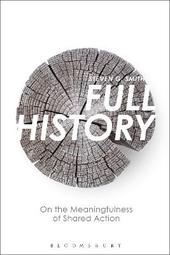
|
Full History: On the Meaningfulness of Shared Action
Paperback / softback
Main Details
| Title |
Full History: On the Meaningfulness of Shared Action
|
| Authors and Contributors |
By (author) Steven G. Smith
|
| Physical Properties |
| Format:Paperback / softback | | Pages:264 | | Dimensions(mm): Height 234,Width 156 |
|
| Category/Genre | History of Western philosophy
Social and political philosophy |
|---|
| ISBN/Barcode |
9781350212565
|
| Classifications | Dewey:901 |
|---|
| Audience | | Undergraduate | | Postgraduate, Research & Scholarly | |
|---|
|
Publishing Details |
| Publisher |
Bloomsbury Publishing PLC
|
| Imprint |
Bloomsbury Academic
|
| Publication Date |
17 September 2020 |
| Publication Country |
United Kingdom
|
Description
How can we take history seriously as real and relevant? Despite the hazards of politically dangerous or misleading accounts of the past, we live our lives in a great network of cooperation with other actors; past, present, and future. We study and reflect on the past as a way of exercising a responsibility for shared action. In each of the chapters of Full History Smith poses a key question about history as a concern for conscious participants in the sharing of action, starting with "What Is Historical Meaningfulness?" and ending with "How Can History Have an Aim?" Constructing new models of historical meaning while engaging critically with perspectives offered by Ranke, Dilthey, Rickert, Heidegger, Eliade, Sartre, Foucault, and Arendt, Smith develops a philosophical account of thinking about history that moves beyond postmodernist skepticism. Full History seeks to expand the cast of significant actors, establishing an inclusive version of the historical that recognizes large-scale cumulative actions but also encourages critical revision and expansion of any paradigm of shared action.
Author Biography
Steven G. Smith is Jennie Carlisle Golding Professor of Philosophy at Millsaps College, USA and the author of The Concept of the Spiritual (1988), Gender Thinking (1992), Worth Doing (2004), and Appeal and Attitude (2005).
ReviewsSmith's book is provocative and so broad in its scope that it seems to want to exemplify the idea of full history. It forces us to think about the idea of fullness, of comprehensiveness, and of what the limitations of history actually are. It has much to tell us about historical inquiry and the historical thinking that lies behind it and leads to it. In the idea of shared action, the author has found a topic that deserves the attention he gives it. * History and Theory * This book offers a startlingly original approach to the question: what are the uses and abuses of history? In clear, clean prose, Smith reveals how history informs the human project of world-making through shared action. The result illuminates the nature of history in surprising and stimulating ways. This is a must read for anyone interested in the nature of history and its role in our collective lives. * Brian C. Fay, William Griffin Professor of Philosophy, Wesleyan University, USA * Full History is an ambitious and important book. It is philosophy of history in the grand manner, such as we have not seen since the middle decades of the last century. Steven Smith breathes new life into the genre, which, as he demonstrates, has always been less about epistemological questioning about the past than about how to live a historically-informed life in the present, in concert with others. Smith's breathtaking erudition and ethical discernment create a new and urgent dialog with many of the major philosophical approaches to history, including those of Hegel, Sartre, Arendt, and Foucault. This capacious study is thus also a philosophical manifesto whose intuitions and proposals will reverberate for many years to come. * Robert Doran, Associate Professor of French and Comparative Literature, University of Rochester, USA * Smith's Full History is an ambitious and original attempt to penetrate into the deep connections between the historical past, present and future. It draws on a considerable breadth of historical examples and is informed by reasonableness and balance. * Notre Dame Philosophical Reviews *
|